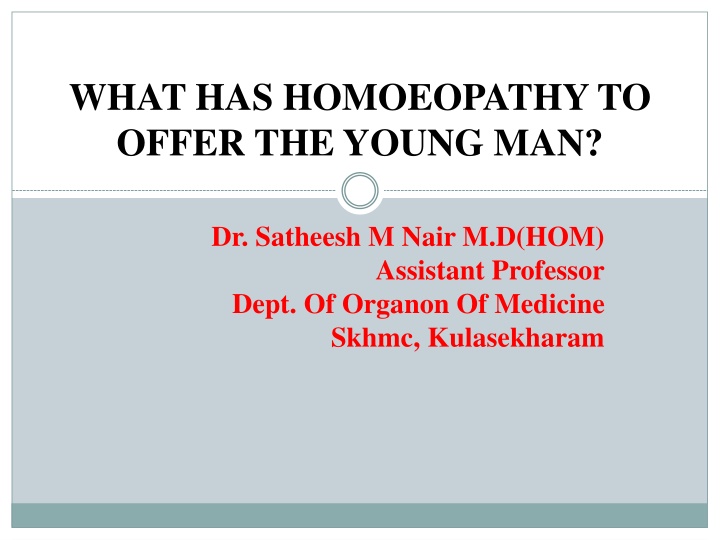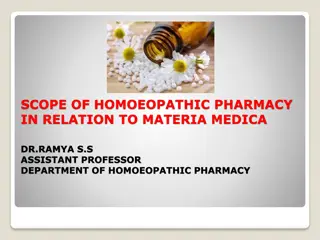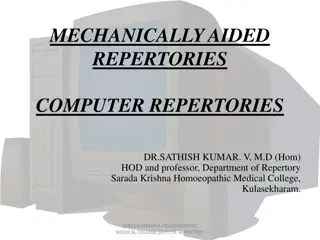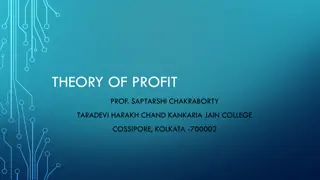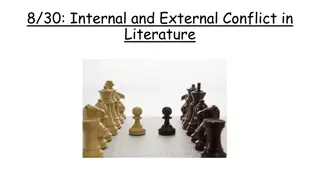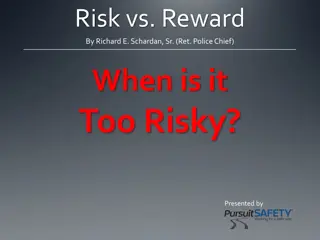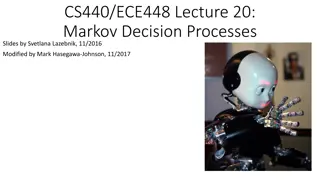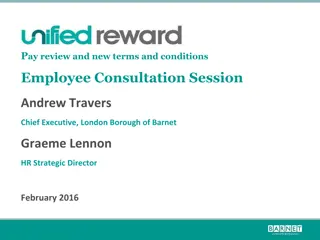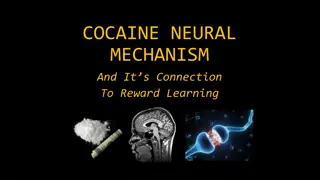Homoeopathy's Offering to the Young Man: A Future of Service and Reward
Homoeopathy offers the young man a path to serving sick humanity with a burning desire to promote better health and happiness. It emphasizes the importance of unselfish service, stability, and adherence to natural laws for a fulfilling career in medicine.
Download Presentation

Please find below an Image/Link to download the presentation.
The content on the website is provided AS IS for your information and personal use only. It may not be sold, licensed, or shared on other websites without obtaining consent from the author.If you encounter any issues during the download, it is possible that the publisher has removed the file from their server.
You are allowed to download the files provided on this website for personal or commercial use, subject to the condition that they are used lawfully. All files are the property of their respective owners.
The content on the website is provided AS IS for your information and personal use only. It may not be sold, licensed, or shared on other websites without obtaining consent from the author.
E N D
Presentation Transcript
WHAT HAS HOMOEOPATHY TO OFFER THE YOUNG MAN? Dr. Satheesh M Nair M.D(HOM) Assistant Professor Dept. Of Organon Of Medicine Skhmc, Kulasekharam
What has homoeopathy to offer the young man as a future? what have you to offer homoeopathy?
What has homoeopathy to offer the young man as a future? Why is he thinking of studying medicine? Is he lazy and does he consider a profession an easy way to earn a living? Does he look upon medicine as a profession to be sought because of its honorable place in the community or as a position to be desired to secure a standing in society? Is he thinking first of the possible financial returns?
If he would use his foothold as a physician for a life of ease, for a position in the community or in society, or for a means of obtaining fame or wealth, hom opathy offers him little that he would care to accept.
If he replies to your question of his idea of the direction of his future so that it leads you to think that he looks upon sick humanity as suffering men and women, that he has a burning desire to serve them, to help them to better health and therefore greater usefulness and happiness, then you may be sure there is a sound foundation upon which we may build a plan of life in which homoeopathy will offer him great reward.
One of the first essentials, now that we are convinced of his unselfish desire to serve, is to determine whether he has stability. If he is mercurial in temperament, easily influenced, and finds it difficult to hold a straight course, always seeking the easiest way, do not encourage him to study homoeopathy.
Homoeopathy is founded upon principles that are in turn founded upon natural laws. If homoeopathy is founded upon natural law, it is as basic. If a man follows where homoeopathy leads, he must be able to follow those laws and to hold close to them regardless of the pressure of influence.
Stability of character must have with it, and in equal measure, the quality of patience. In ordinary medicine the quality of patience seemingly is not so necessary. The man who considers homoeopathy as a possible future must be a student of people and willing to become a student of philosophy.
He must be able to read between the true and the false in any symptoms the patient may give; he must possess a sense of values. He must train himself to observe all those signs which the vital energy writes upon the human face, and he must be able to interpret all the signs, which show through habits and circumstances, into indications for the health- restoring medicines which he has at his command. Hours must be spent in patient study, tracing the course of the disturbance and the remedy to fit it, always basing the process upon the sound rock of natural law.
To the young man who is equipped, and willing to undergo the training for this lifelong task, homoeopathy has everything to offer.
In the first place, homoeopathy offers to the independent mind an opportunity continually to seek new verifications of the natural laws upon which this system of medicine is based.
Homoeopathy offers a life of service to humanity, and it is the only method of healing that surely sets the sick man and sick woman on the permanent road to recovery. We must remember that though we may fail, the failure is ours; it is not the failure of homoeopathy. The better knowledge we have of the "tool of our trade" the better use we should make of them.
Homoeopathy treats the sick individual; it is therefore a specialty. Homoeopathy offers a special inducement to the man who can teach people to think and act as individuals, and to demand medical treatment as individuals.
Homoeopathic medicine goes even further than this, for homoeopathy seeks to relieve the individual as much as possible from the heavy burden of the hereditary tendencies he carries, and to guard against increasing this load by enabling his vital energy to provide its own immunity against disease. Homepopathy looks upon the health of the individual as a precious charge, and the return of the individual to health as almost certain if we but follow the fundamental laws.
One of the outstanding problems today is cancer. It intrigues the mind of the young man, and his search for the cause and cure of cancer is indefatigable. This is a challenge to the homoeopathic physician as well, since he has remedial aids that ordinary practice knows not;. If he takes up the task on the frontier of cancer study, will he remember the relationship between homoeopathy (not isopathy) and disease conditions, or will he forget that human cell tissue is easily stimulated to over growth, under certain hereditary tendencies? He has here a field for work which offers much elbow room and all the dangers of the pioneer.
The homoeopathic school accentuates the study of the action of drugs upon healthy human beings, with little consideration of their action on the lower animals, for homoeopathy recognizes that it is only through a knowledge of their action on man that we can obtain a correct perception of their applicability in disease. The field here is ripe for much investigation, and the results of such investigation would enrich the homoeopathic materia medica by completing provings of some of the older remedies, and by bringing out provings of new remedies. This is an opportunity that only homoeopathy offers, for the teaching of remedy reaction has ceased in ordinary medical colleges.
The decision lies with the individual, and what he is determined to secure from his life work. If it is financial ambition, he had better not take up homoeopathy. Homoeopathy is a principle, and principles brook no division of loyalty. If he has at heart the desire to serve, he may find fame and riches at his door as well as that keen satisfaction of knowing that he has brought to his clientele the gift of healing in the safest, gentlest and most rapid manner.
For the man who can help the community, as individuals, toward a higher level of health, the community has a place of honor; for the man who can assist Nature to cure serious illness a certain fame in the community there is burning, perhaps not the bright flame of the comet, but a steady glow of light for his path. For the man who spends himself unceasingly for those about him the community will return a comfortable livelihood, not the spectacular fortune offered in some lines of endeavor, but a competence which will enable him to keep his family in a well earned place in the community.
Homoeopathy as a profession carried a challenge. The possibilities of its art are infinite.
What future has homoeopathy to offer to you? Young man, what have you to offer homoeopathy?
